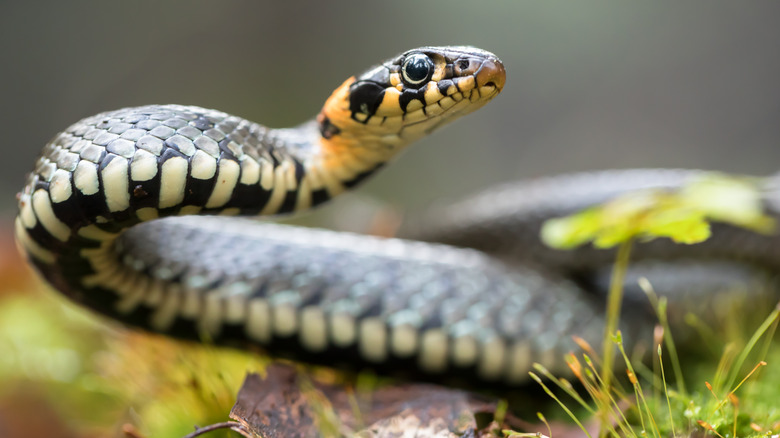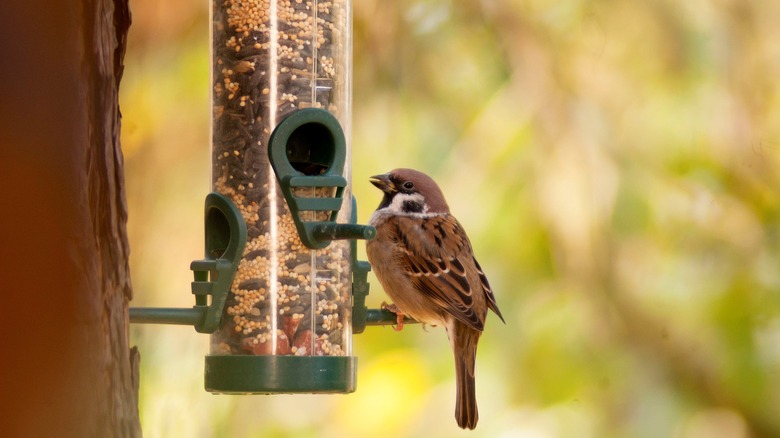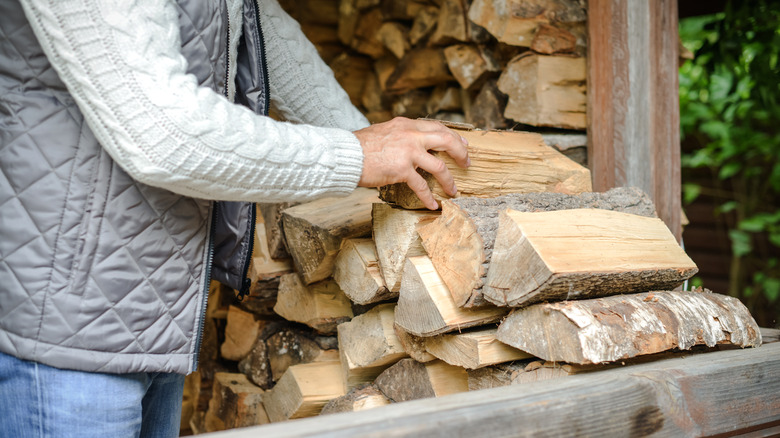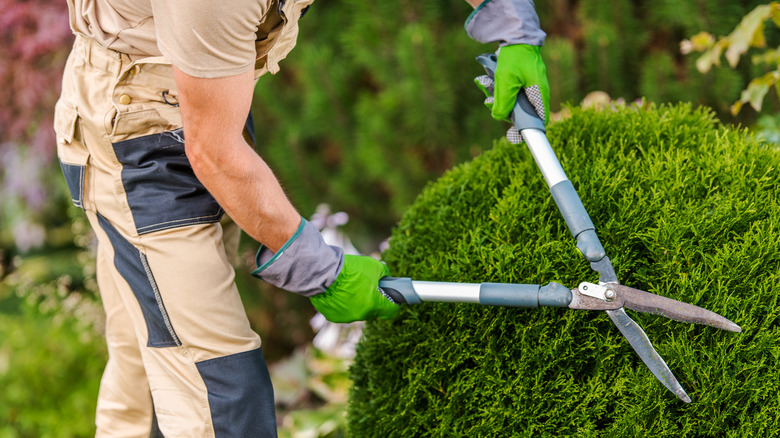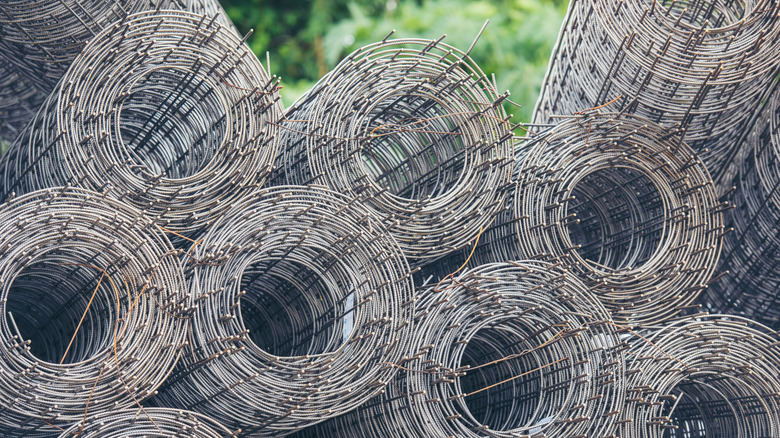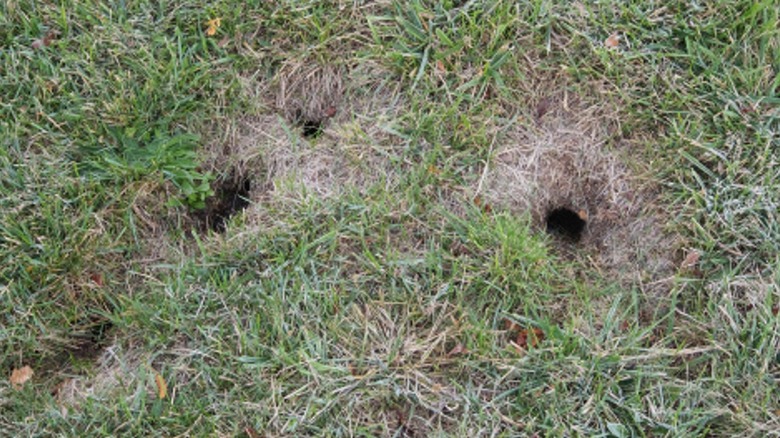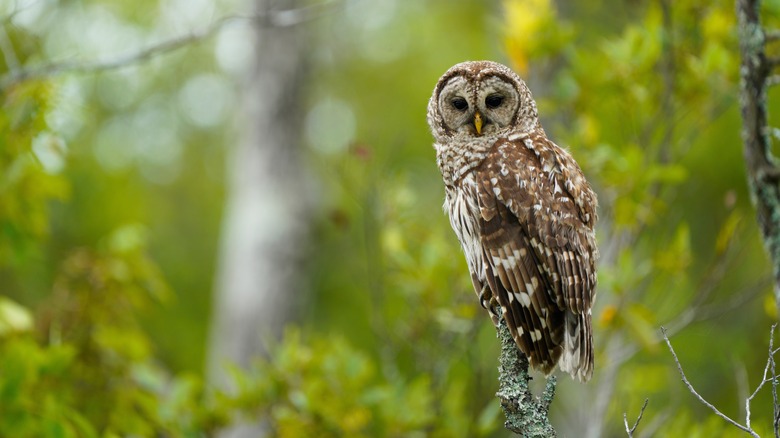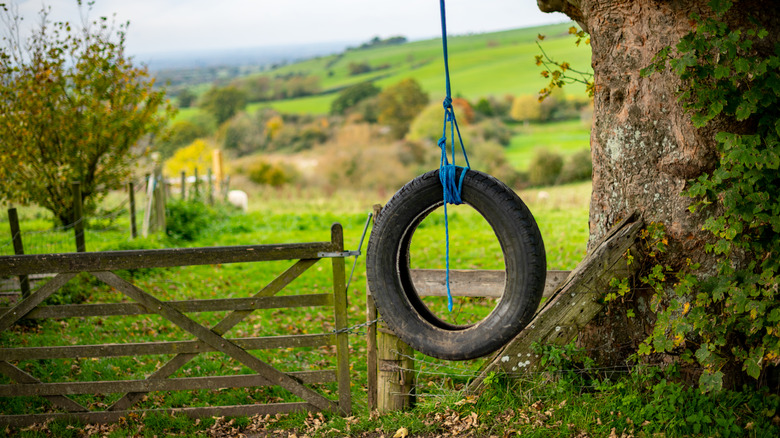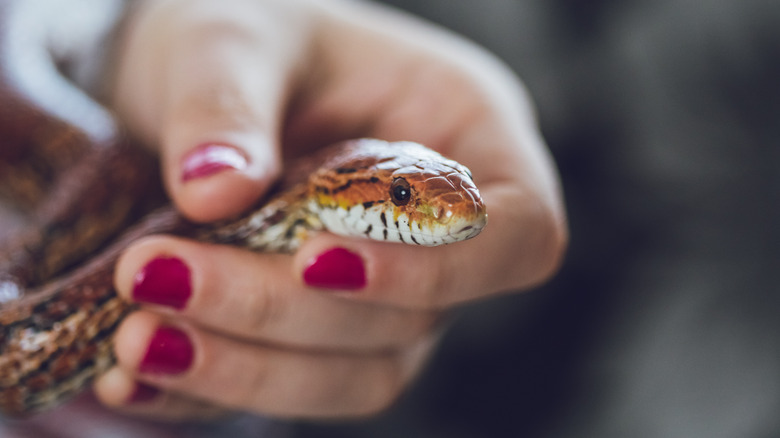Foolproof Ways To Keep Snakes From Slithering Around In Your Yard
Generally speaking, seeing a snake in your yard isn't reason for alarm. They play an important role in our environment and can actually help protect your garden and home by hunting rodents or other pests. That being said, some of us just don't like them, even if we know they are not venomous and aren't likely to harm us. If you prefer to keep your yard free of these slithering and scaly creatures, there are a few things you can do.
Some of the tips shared below can help you clear up a current snake problem by encouraging any species that may be lurking in your grass, garden, or wood clippings to vacate the premises. A few of the other tips share some best practices to deter the serpents from making themselves at home in the first place. After you've had a chance to read through the next few sections, you will feel empowered to turn your yard into a snake-free zone.
Keep your grass short
If you don't mow your lawn regularly, that is something you'll want to change if you're looking to deter snakes from settling in. Longer grass provides plenty of cover for these serpents to hide from hawks, owls, and other predators. If you mow your grass often — and cut it short when you do — there won't be anywhere for the snakes to hide from other animals that may be hunting them. They'll realize this and look to find somewhere else to stay that will provide the shelter and protection they desire.
The frequency you'll need to mow your grass will vary based on the time of year, where you live, and various other factors. During the warmer months, when it's growing quickly, you may find that you need to mow more than once a week. Less frequent mowing will be necessary if the weather is overly hot or cold. With shorter grass, you'll also be more easily able to spot snakes in the yard to identify a potential problem.
Make changes to how you're feeding the birds
If you have a bird feeder, you may enjoy watching the various species visit your yard as they get a snack. However, that same bird feeder that is encouraging your feathered friends to drop by for a visit may inadvertently be welcoming snakes to your yard as well. A sneaky bird feeder downside is that birds miss bits of seed as they peck at it, sending them to the ground instead. While the snakes aren't likely to be too interested in the birdseed, other rodents will. And once these other rodents start showing up, it is just a matter of time before serpents decide that your yard is a top spot for them to hunt for their meals. Snakes may also be attracted to prey on the birds themselves as well.
Getting rid of your birdfeeder altogether — or at least not leaving it out during the spring or summer — would be the most effective option. However, if you don't want to go that far, there are steps you could take to mitigate the risk it poses. Start by giving all of your bird feeders a deep cleaning to help deter some rodents who are attracted to them. Then, only fill the feeders about halfway, as it will limit the amount of seed that is scattered when birds stop by for a snack. You will also want to be purposeful by placing them farther away from your house to keep any unwelcome visitors from getting too close.
Don't store firewood, lumber, or other wood materials close to your home
Like other animals, snakes look for somewhere to stay that will meet their basic needs. Shelter is one of these key basic needs. If they find something that offers them protection from the elements and helps them stay hidden from their predators, they're more likely to settle in. We already discussed the importance of keeping grass cut short for this reason, but they can find cover in other places in a yard as well. Piles of wood, such as logs for the fireplace or wooden building materials, make an ideal hiding place where a snake can stay warm and cozy.
If you have scraps of wood or tree trimmings that are trash, dispose of them properly to get them off of your property. Moving firewood or building materials out of the yard completely may not be an option, but you can move them farther away from your home to keep the slithering reptiles from getting too close. Storing wood on elevated pallets and then covering it with a tarp can add an additional line of defense.
Limit excess water in the yard
Water is another thing that can attract snakes to your yard. Damp grass, puddles from rainstorms, bird baths, containers of stagnant water, fountains, ponds, and other water features are just a few examples of types of water that could encourage these serpents to make themselves at home.
One thing to avoid is overwatering your lawn. Not only will the excess water create a more pleasing environment for the scaly reptiles, but it will also attract frogs, slugs, and other animals that snakes prey on. This will only increase the likelihood of a slithering reptile stopping by. Next, inspect your yard for any areas with standing water. They need H2O to drink and stay cool during warmer temps, so it will attract them as a homey spot to post. If you have buckets or other containers collecting water, turn them upside down. Consider getting rid of birdbaths and turning off fountains until you've at least booted out all unwelcome guests.
Be purposeful with your landscaping
Making a few changes to your home's landscaping is another way to keep snakes away — or at least ensure they cannot remain hidden and undetected. If you have bushes and trees close to your house, they can offer a secret oasis where the serpents can stay unspotted. Instead of letting bushes and shrubs grow right up against the house, trim them back to leave an opening against the house. Also, aim to cut the base of the bushes so that they are several inches — or even feet — off of the ground.
Overly dense shrubs and bushes should also be trimmed back to increase visibility. If you regularly have a problem with snakes hiding around your house, you may even decide that it is best to remove some of these shrubs altogether, or at least move them to a different location in the yard.
Use fencing
Using a fence to keep snakes out isn't easy and won't be 100% effective, but it can help decrease the number that slither into your yard. Because of how small and agile they are, a standard fence isn't going to be sufficient to keep them out. You'll need to snake-proof your existing barrier using a very wire mesh.
If you want your fence to be the most effective, it is essential to ensure there are no gaps along the mesh. You'll also have to do more than simply line it along the existing post. Instead, you'll want to bury it 3 to 4 inches below the soil to prevent the critters from sliding under the mesh. Positioning the base of the mesh so that it curves at an angle about 7 to 10 inches away from your yard can provide an additional layer of defense. Periodically inspect it and address any holes or gaps to ensure it still fortifies your space.
Fill old gopher burrows
Both snakes and gophers can leave holes in your yard. However, while snakes typically live in open holes, gophers plug theirs. This leaves a visible mound of dirt above the crater. Seeing such a mound can help you distinguish between the two and identify which pesky critter you're dealing with.
Unfortunately, even if gophers originally created the holes in your yard, that doesn't mean a snake might not take up residence in one of them. In fact, these limbless reptiles don't dig holes themselves. They look for existing ones made by other creatures and move themselves in. To decrease the chances that the serpents will take refuge in your lawn, you should fill any old gopher burrows that may be scattered throughout your yard. Use some dirt or gravel to pack the hole and take away a potential home and hiding spot for a very unwelcome guest.
Welcome natural predators to your yard
Snakes are well-known for hunting small rodents that may be in your yard. However, the hunters can sometimes become the hunted. Snakes are not free of predators themselves. In fact, several animals prey on these creatures, including foxes, hawks, owls, raccoons, cats, pigs, turkeys, and guinea hens.
If you've had enough of these slithering serpents, you could try to attract some of these natural predators to your yard. A perch pole can be effective for attracting owls and hawks. If you put it above a more open section of the yard, the birds will be able to spot their prey more easily. If you want to try attracting a few neighborhood or stray cats to your yard, try leaving some cat food out for them. Just be purposeful with where you put it to ensure that it is out of the reach of the snakes. Make sure to leave food out around the same time each day so the cats know to come to look for it.
Use smoke
You know the saying: Where there's smoke, there's fire. Well, in the case of our slithering friends, it could be revised to: Where there's smoke, there are no snakes. That's right, using smoke may be able to help you keep your yard free of these pests. As you know, smoke has a very distinct odor, which snakes do not like. Spending more time outside around the fire pit may help keep them out of your yard. If it is safe to do so (i.e., you do not live in an area with a high risk of wildfires), you might also want to try digging a fire pit and letting it smoke for a few days to rid your yard of the pests.
Using a fire pit or campfire to keep them away will be most effective during the warmer months. If the weather is very cold outside, the serpents could actually become attracted to the smoke and fire because of their desire to find warmth. Remember, these animals cannot regulate their temperature like some other animals can, so they often have to find a source to help them stay warm.
Try a natural repellent
Repellents can be an effective solution for keeping slithering reptiles out of your yard. Fortunately, you don't need to use any harmful chemicals, as there are several natural options that can work very well. One option is to make a DIY spray using onions and garlic, two ingredients that contain sulfonic acid. Snakes do not like sulfonic acid — the compound responsible for making your eyes tear when you chop an onion — and will avoid areas where they detect it.
They also abhor the scent of cinnamon and cloves, so making your own deterrent spray using these two ingredients may also be effective. There are also a few plants that naturally deter these pests. These include lemongrass, wormwood, roses, and mother-in-law's tongue (also known as snake plants because they resemble the long and scaly creatures). You can try planting these where you most commonly see the intruders in your yard.
Don't feed your pets outside
You might find that feeding your dog, cat, or other pets outside makes your life easier. You don't need to worry about their food dropping out of the bowl and leaving a mess for you to clean up. Plus, after they've finished eating, they're already outside and can go take care of their business right away. However, feeding your pets outside is not a good idea when trying to deter snakes from entering your yard or getting them to leave your property.
That's because any bits of food that they miss will attract mice, rats, and other rodents. These are all animals that snakes prey on, so once you have more of them in your yard, the serpents are more likely to follow. For this same reason, avoid even storing pet food outside. If you don't want it in your house for whatever reason, store it in a tightly sealed container in the garage or shed.
Be mindful of tire swings and other children's toys
If you have children, some of their toys could actually be attracting more snakes to your yard. Tire swings, in particular, are one item that these reptiles really like. Think about the design of a tire swing. There are lots of ridges, crevices, and open compartments. Whenever it rains, the water collects in all of these locations. Snakes will see the swing as an excellent home that will provide them with the water they need to stay alive and healthy. If your kids still use your tire swing, and you don't want to get rid of it, you could drill a few holes in the base of the tire. This will ensure the water drains from it and that it isn't seen as a nice home for an intruder.
Tire swings aren't the only children's toys that could bring in unwanted visitors. Slides and other toys that are close to the ground can also collect water for the serpents to get. Encourage your children to store toys in a shed or garage when they are not being played with, and drill drainage holes in slides and other larger items that can not be moved.
Call in a professional
There may be times when everything you try just doesn't seem to be enough to keep snakes from returning to your yard. In these cases, it is probably best to call a professional exterminator. If you fail to get the snakes out of your yard, they could end up finding their way into your home through tiny holes or cracks. Hiring a professional exterminator can help ensure that your problem is solved before it gets any worse.
Professionals are also trained in how to handle and remove various species. Leaving this task to them is the safest option to protect you and others in your home from a bite, even if the species invading your space isn't venomous. Experts are also knowledgeable about the different species living in your area and how to remove them without violating regional wildlife protection regulations. The price of removal will likely vary based on the area in which you live and your specific situation. In most cases, you should expect to spend between $100 and $200 for this service.
